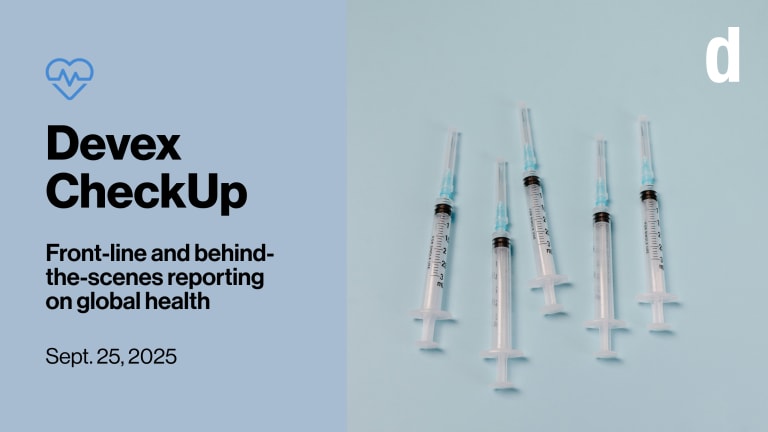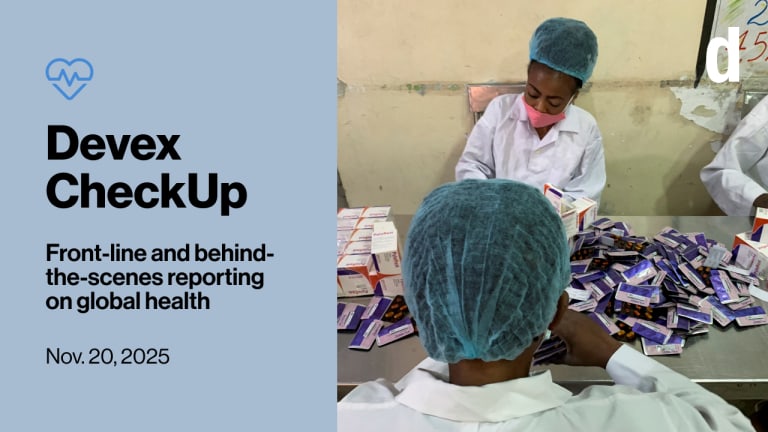Presented by Illumina

By now, you have probably heard that the Global Fund did not meet its replenishment goals yesterday. Despite dire warnings about the consequences of missing the $18 billion target, reactions since the pledging conference have included pragmatic acceptance and cautious optimism. While the United Kingdom’s failure to commit anything at all — it also pledged nothing for the treatment of severe acute malnutrition — was the big story, we bring you inside the replenishment event for more details.
This is a preview of Devex CheckUp
Sign up to this newsletter for exclusive global health news and insider insights, in your inbox every Thursday.
A total of 45 countries — including 18 African countries — made commitments that amounted to a final tally of $14.25 billion, slightly exceeding the amount raised in the last Global Fund pledging cycle.
• This is “the most significant, the largest, single fundraising for global health ever,” Global Fund Executive Director Peter Sands told our colleague Omar Mohammed at the end of the pledging conference in New York.
• At a Devex @ UNGA 77 event hosted on the sidelines, Chris Collins, the president and CEO at Friends of the Global Fight Against AIDS, Tuberculosis and Malaria, said that the Global Fund replenishment is one of the most important barometers of global health funding. The fact that the majority of the Group of Seven leading industrial nations increased their contributions by about 30% sends a strong signal that even in trying economic times, these investments are important, he said.
• Four countries pledged sums exceeding 1 billion — similar to the last replenishment event — but Japan was a newcomer to the billion-dollar club. Also welcome was the fact that smaller countries also made commitments, illustrating “it was not a traditional donor-recipient relationship” but about partnership and co-creation, with everyone having a “skin in the game,” The Rockefeller Foundation’s Dr. Naveen Rao said at Devex’s event Wednesday.
• The replenishment also raised more from private donors than it ever has before — a total of $1.23 billion. The majority of that sum came from the Bill & Melinda Gates Foundation, which pledged $912 million. Several of the other nongovernmental pledges were intended to support specific funds or objectives, our colleagues Adva Saldinger and Omar report.
Read: Global Fund falls short of $18 billion target as UK, Italy delay pledges
What can $30 get you?
“67 hours later, I got medical help. But that was because I had 30 bucks. And if not, I was just a Congolese person with a Congolese fate.”
— Ashley Judd, goodwill ambassador, United Nations Population FundBack in 2021, actress and activist Ashley Judd had an accident in the middle of the Congolese rainforest — she tripped and broke her leg, and had to wait for over five hours before someone came to her rescue. During a conversation with Devex Executive Vice President Kate Warren on Wednesday, she said that experience demonstrated to her what it's like to not have a local health infrastructure in these places.
"My Congolese brothers carried me out of the rainforest and eventually to a motorbike, where I had to hold the bones of my legs together for six hours bouncing through the rain forest on a rough trail,” she said, adding that eventually, a bush plane came to get her.
Watch day two of our programming on the sidelines of the United Nations General Assembly.
Also: Listen to Chelsea Clinton, vice chair of the Clinton Foundation, on our new podcast “UNGA Decoded” where she outlines the need for investment in community resilience for future risks.
+ Check out previous episodes of “UNGA Decoded,” where we talked with World Central Kitchen founder José Andrés on food as national security. To not miss an episode make sure to subscribe on Apple Podcasts, Spotify, Soundcloud, or YouTube.
Not the final ACT?
In a recent conversation with Amruta, Dr. Ayoade Alakija, WHO special envoy of the Access to COVID-19 Tools Accelerator, or ACT-A, cleared the air on the status of the coordinating body, which was reported to be “winding down.”
“Nothing is ending because the pandemic has evolved and the virus is evolving,” she said. Admitting that it was a flawed mechanism, she said it was the only option at a time of crisis. However, while it had performed well in investments in diagnostics, treatments, and vaccines, it has not reached its goal for ensuring equity. “We have failed on equitable access,” she added.
Q&A with Dr. Ayoade Alakija: ‘ACT-A is not winding down’
‘It really blew me away’
$280 million
—That’s the unprecedented amount donors pledged for malnutrition treatment at an event on the sidelines of UNGA on Wednesday, more than doubling financial commitments made in July to increase access to ready-to-use-therapeutic food as famine looms in multiple countries.
The event follows a $200 million commitment from USAID and $50 million from private philanthropy made in July. USAID Administrator Samantha Power challenged other donors to match those funds with another $250 million by high-level week at the General Assembly.
“It really blew me away,” Blythe Thomas, initiative director at 1,000 Days, told our colleague Teresa Welsh. “This has the potential to save hundreds of thousands of children.”
Read: Unprecedented $280M raised for child malnutrition treatment
First out of the Gates
In a Devex analysis of Gates Foundation grant winners over the last 23 years, more than 60% of the foundation’s money went to the World Health Organization.
So was the Gates Foundation the biggest donor to the health organization? Not quite: In the two-year 2020-2021 budget cycling, the foundation was second in WHO’s list of contributors, donating $751 million. Learn who topped WHO’s list and check out the rest of the Gates Foundations grant winners.
Funding insights: Gates Foundation’s top 10 emergency response grant winners (Pro)
+ For Devex Pro members, we have a breakdown of how much money the Gates Foundation has spent on global health programs over the past 24 years, and which organizations are among its top 10 grantees. To read the piece, start your free 15-day trial of Devex Pro today.
Your next job?
Senior Program Officer, Global Health Agencies
Bill & Melinda Gates Foundation
Seattle
By the numbers
WHO launched a new platform that includes country-level noncommunicable diseases data and published a report showing the scale of the burden of NCDs globally. It contains some alarming numbers. Jenny combed through the report and data portal to get these takeaways:
• Every 2 seconds, someone under the age of 70 dies from an NCD.
• Ninety-six percent of all deaths in North Macedonia are due to NCDs.
• The highest rates of obesity in adults are in Nauru, where 61% of people over 18 are obese, and 49% of people over 15 use tobacco.
What we’re reading
Uganda declares outbreak of rare Ebola strain with no approved vaccine. [Devex]
Regulators in India and China give greenlight to inhaled and nasal spray COVID-19 vaccines. [The Wall Street Journal]
A fungal pandemic that killed amphibians is now threatening humans. [Wired]










